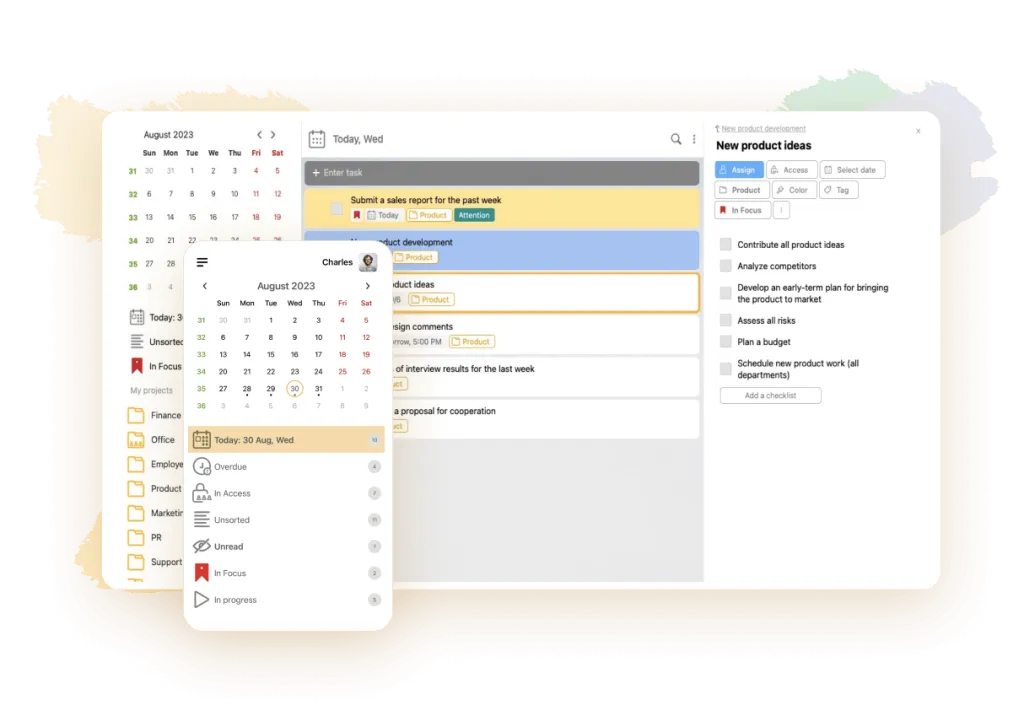March 5, 2024
The ability to manage your life is a delicate art, once mastered, you will be able to achieve better results with less effort. Without control over yourself, the ability to overcome external circumstances, rational use of accumulated experience, it is impossible to effectively manage people. If you do not develop these qualities in yourself, you run the risk of forever remaining among the ordinary performers.
Not everyone is a leader by birth. But he can become one if he learns to set goals correctly, select tools for their successful achievement, and manage his life, abilities, and time competently. For the management of personal activities developed a special set of techniques called self-management. Often this concept is identified with time management, which is a method of rational organization of time. But, in fact, this category has a broader meaning. What is self-management? How does it help to become more successful and manage people, company or personal life? Let’s try to understand it.
Concept, objectives and functions of self-management
The most valuable resource for a modern person is not money or social connections. Time is much more important. If you use it wisely and allocate it to solve vital tasks, your chances of success and career advancement will increase significantly.
Self-management is a consistent and purposeful use of various methods, tools and techniques for optimal and meaningful use of time. It is a tool for self-improvement, self-management and personal development. Rational self-management is related to human nature (individual, personal factors, individual genetics), organization (of ideas, things, people or relationships), and social management.
The main goal of self-management can be formulated as maximum concentration of all available resources to accelerate various procedures and actions. A person (manager, manager) should:
-
Make 100% use of your time and potential abilities;
-
Consciously manage your life and time;
-
Overcome any external work and personal circumstances.
Self-management is essential for every person who wants to use their time efficiently and effectively. It is useful for those who need to improve their performance. Self-management as a tool for self-organization and personal development is important not only for managers of companies, managing people. To achieve better results in work and life, its principles should become a habit. For this purpose it is necessary to constantly work on oneself, to cultivate diligence, skills of sober, logical thinking.
The basic theses of self-management are:
-
Setting specific, realistic, achievable goals;
-
Forming a vision of success in your head (in the form of material well-being, environment, health, other important aspects of life);
-
Using the “big leap” methodology to achieve goals - start acting as soon as possible;
-
Belief in your own strengths and capabilities;
-
Concentrating on key goals in life (sifting out secondary, unimportant tasks);
-
Practice the skill of self-control, even if the experience is unsuccessful at first.
Self-management provides an opportunity to effectively use basic personal resources: time, activity, education, ability to pay. It helps to manage the processes of life activity due to the rational organization of work and rest periods. Promotes proper career development. Improves the manager’s performance by raising the level of qualification, developing personal qualities, forming a positive image in the eyes of the management or potential employers.
Benefits of implementing a self-management system

Formation of the skill of self-organization and self-control gives executives, managers and ordinary performers a lot of advantages in work and personal life. Among them it is worth highlighting:
-
Saving time and effort to get the job done;
-
Rational organization of work, allowing to achieve better economic results under normal conditions;
-
Reducing workload, preventing stressful situations due to the fear of not being able to complete tasks on time;
-
Obtaining moral and psychological satisfaction from the successful completion of the work;
-
Motivation for further development and proactive action;
-
Professional development and skill development;
-
Improving labor outcomes;
-
Achieving life and professional goals in the shortest possible way.
The main point of self-management is to get rid of overload. To learn to keep a balance between work and ordinary life, to get pleasure and joy from it. A balanced, self-controlled person has logical thinking, is able to quickly make balanced decisions, and is better able to cope with stress. He is more useful and productive as a leader or team member.
Principles of self-management
The art of self-management helps you achieve your goals faster, regardless of the field in which they are located. By utilizing its principles in your work or personal life, you will greatly increase your success and productivity. These are:
Systematicity
It is impossible to become the best specialist or manager in a company, earn a lot of money or radically change one’s life all at once. The secret of its serious, profound transformation lies in the regularity and systematicity of efforts aimed at achieving goals. In this aspect, self-management is an improvised circle divided into sectors - steps leading to a certain result. The goal is set? Then move on to planning your resources and environment. Next, think of a worthy motivation that will push you to the upcoming success. Are you sure you’ll succeed? Evaluate your achievements and gradually raise the bar. Acting consistently and purposefully, you will successfully overcome any, the most difficult path.
Small actions
This principle can be summarized as follows: don’t work too hard to achieve a goal. Make small efforts, but consistently. If you have set yourself a goal to start running in the morning, do not set yourself too high requirements. For example, run 10 kilometers on the first day. The first unsuccessful attempt can severely undermine your confidence and determination. You will not have the strength and desire to continue this endeavor. Only as you progress gradually will you notice obvious progress. Start your workouts with short ten-minute jogs. Plan them for the same time. After a week in this rhythm, you will notice how your character and willpower have strengthened. Then you can gradually increase the workload.
Your key goal should be challenging and ambitious enough. If you view your daily efforts to achieve it as small steps, don’t be lazy, gradually move towards it with these small steps, it will not seem unattainable and frightening.
Intrinsic purpose and motivation
To be successfully achieved, global goals must correspond to inner needs and desires. Deep human needs are always based on two motives: the desire to receive a reward or to avoid suffering, punishment. Have you decided to finally quit smoking? Ask yourself a question: why do you want to do it? To avoid getting sick, to have good teeth, or to get rid of health problems? Or to look better in the eyes of others, to raise your self-esteem?
Having formed an internal goal in your head, it is easier to decide to take the first step to achieve it. So be sure to ask yourself: “What do I really want?”.
Inert development
Your main mission is to develop and improve your personality. Don’t beat yourself up for not being able to reach the coveted million subscribers on your channel or increase your salary level by 100%. Choose a direction that interests you and develop in it. Learn languages, attend seminars, read books, communicate with interesting and successful people. If your desire to develop is really sincere and conscious, all your efforts will help you get to your goal faster.
By working on your habits, attitudes, and emotions, you will achieve professional and career growth. Remember that your main goal is not to copy someone else, but to become the best version of yourself.
Common myths about self-management
The concept of self-management is familiar to many people. Nevertheless, there are no more successful and productive people. As before, they prefer to “go with the flow”, believing that they will not be able to change anything in their lives. In this regard, certain myths related to this tool of self-management have arisen.
Myth 1: Self-management is only necessary for managers. As long as I haven’t become one, it doesn’t concern me
This statement is very far from the truth. Without learning how to allocate your resources and opportunities competently, you will never be able to move up the career ladder! Without showing yourself as a person who effectively manages himself, you cannot claim to manage other people.
The main benefit of self-management is to master the skill of consciously managing work and life processes. The ability to overcome any external, internal obstacles on the way to the goal. It is of practical benefit to any person, whether a salaried employee or an entrepreneur. Learning to manage yourself, your abilities, talents, time, you will achieve your goals faster. You will feel satisfaction from the work done. Make sure that your time and efforts are not spent in vain.
Myth 2: Self-control is necessary in critical or emergency situations. It is of little use in life
Will you be able to explain yourself fluently in another language in a foreign country if you have not studied it before? The situation is similar with self-management. Like any other skill, the ability to rationally manage your time, abilities or other resources needs to be practiced. A difficult project, an emergency at work or in life is not the best time to practice. By pulling yourself together, concentrating on solving the problem, you will certainly find a way out of a difficult situation. But, only by turning self-management into a useful habit and part of your life, you will be able to avoid many stresses, as you will always know what you need to do at a given time.
Judge for yourself, if this technique works well in critical conditions, why not adopt it in ordinary life?
Myth 3: Self-organization cannot be learned. It is either there or it is not
If you have the desire and systematic efforts, you can learn anything. According to experts in the field of time management - the skills of rational time management, it is quite possible to hone on courses or independently.
The first option is more appropriate for company personnel. The organization of corporate classes allows to better unite the team, to eliminate artificial division due to arising misunderstandings. For personal mastering of the methodology there is a lot of interesting, informative literature with an accessible and simple presentation of the material. These are theoretical publications describing principles and techniques, biographies of famous people who are guided in life by the principles of self-management.
Functions of self-management
The daily tasks are closely interrelated with each other. They are carried out in a certain sequence, forming a “Circle of Rules”. It demonstrates the dependence between the individual functions of self-management. There are six functions in the outer circle:
-
Goal-setting, clear goal-setting with visualization of the final result in real terms. You must understand what result your activity should bring.
-
Planning, drawing up a step-by-step “road map” defining your actions on the way to achieving the planned goals. Finding sources and resources for their realization.
-
Decision-making. This is done by choosing the most favorable option among several alternatives offered.
-
Organization of personal space and working time with the creation of a convenient work schedule and strict adherence to it.
-
Systematic control over oneself with analysis of compliance of the obtained results with the planned indicators at all stages of work.
-
Working out communication channels and effective communications.
Self-management is necessary to determine the amount of one’s resources in various areas. To be able to manage them competently without damage to yourself and others. Development and strengthening of internal and external resources to achieve life goals. Studying options, acquiring new means, qualities, properties, competencies for development and self-improvement.
Methods of self-management
Each function has its own objectives and methods of achieving them. Their interrelation is presented in the following table:
| Self-management | ||
|---|---|---|
| Functions | Objectives | Methods of achieving them |
| Goal setting | Motivation, ability to identify and utilize one’s strengths, be consistent in one’s actions. | Situational analysis |
| Planning | Finding resources, time allocation. | Short-term planning.Keeping a diary, diary.ALPEN technique. |
| Solutions | Choosing among variants of events, prioritization of tasks. | Pareto method. ABC methodology. Eisenhower matrix. Delegation |
| Organization of work processes | Control of work at each stage, analysis of achieved results. | Create to-do lists taking into account natural biorhythms.Track workload on a graph. |
Let’s take a closer look at each of the techniques presented:
Goal setting
All processes have time constraints, adjusted according to external and internal factors. In order to set the right benchmarks, it is important to understand where you are at a given time, where you want to go, where you do not want to be under any circumstances.
Short-term goals and objectives should be in line with your long-term strategy. They should be as clear and concise as possible. You can use the SMART method to set them. According to this technology, your goals should be realistic, measurable and time-bound, in line with the company’s strategy.
Planning
According to many experienced managers, when effective planning techniques are incorporated into the self-management of the executive team, any project tasks are completed quickly and promptly. The 60:40 concept is well suited for time allocation. Its essence is that plans should be made for 60% of the time, and the remaining 40% should be set aside as a contingency reserve.
The second important principle to adhere to when making strategic and current plans is regularity, systematicity and consistency. Plan things regularly, systematically and consistently to be able to do them well by the deadline.
Decision-making
When starting to work on tasks, follow the rule of prioritizing them. Important tasks should be done first. Secondary, unimportant tasks can be postponed or deferred. Several effective methods have been developed for managers to help them make quick and competent decisions. These include:
-
The Pareto principle (or 80/20 method). In this context, it means that 80% of tasks can be accomplished in 20% of working time. But, you should start with the priority and serious ones.
-
ABB method. Under this abbreviation there are three types of tasks on which different categories of performers should work. Type A tasks are solved exclusively by the manager. B-type issues are delegated to assistants, and C-type tasks are delegated to rank-and-file employees.
The Eisenhower technique is widely used in self-management, which allows for competent prioritization of tasks. According to this technique, all cases are divided into the following groups:
-
Urgent and very important (the supervisor is responsible for them);
-
Urgent but not very important (they are assigned to staff);
-
Important, but not urgent (these are performed by the manager, to the extent possible, not necessarily today);
-
Non-urgent and unimportant (they are postponed for later, performed at will).
Organization and implementation of the plans outlined

This stage includes activities to organize the day’s activities. Creating a schedule, to-do list and tasks. The working day can be divided into three parts: beginning, middle and end. There are certain rules for the successful fulfillment of planned tasks and to-do’s in these segments:
Early in the day:
-
Put yourself in a positive frame of mind.
-
Start work at the same time.
-
Do your planning the night before, do a brief review of your planned activities first thing in the morning.
-
Prioritize tasks. Always start your work with the important things.
-
Coordinate your plans with others involved in the process as needed.
In the middle:
-
Use logical thinking as you work through the tasks.
-
Set realistic deadlines for their completion.
-
Double-check your results, monitor yourself.
-
Follow the plan, don’t give in to sudden impulses to change something.
-
Work at a moderate pace, with rest breaks.
-
Small, similar tasks, solve in one go.
-
Take your work to its logical conclusion. If you get distracted, you will find it difficult to return to its completion.
-
Schedule time for routine tasks.
-
Important and complicated tasks should be done in the first half of the day. Simpler tasks can be done later in the day.
-
Control the time available to you. Match it to the plans you have made.
-
Finish small tasks started in the middle of the day.
-
Evaluate the results of the work you have done.
-
Make a plan for tomorrow.
End of the day:
By the end of the working day, all current tasks should be completed. Remember, you have the power to subordinate your work, not to submit to it. Therefore, be sure to adhere to these rules.
Rules of effective self-management for a project manager
Self-management skills are especially important for managers. Their ability to organize their working time, space, ability to rationally distribute resources, and desire for self-development determine the prospect of achieving key objectives and the success of the project. The following rules will help to achieve better results in joint activities:
-
It is mandatory to record your plans on paper, in attachments or electronic documents with a deadline. Based on your to-do list, you will have clear instructions describing the tasks that need to be completed by a certain time.
-
Break down large-scale tasks into smaller ones. This technique will reduce the fear of responsibility. By completing smaller tasks individually, your team will get closer to the end point faster.
-
Get your priorities right. The most complex tasks require more resources and time. Therefore, they should definitely be at the top of the priority list. But, small tasks should not be forgotten either. They can be organized in between the main work.
-
Don’t forget to be productive. Working on large, multi-step projects doesn’t tolerate distractions or inattention. Schedule time for rest and breaks. Don’t get distracted by social media and messengers. Set aside a separate time to check them.
-
Set achievable goals for yourself and your team. They should be measurable and understandable to each performer.
-
Properly delegate authority. Every manager knows that it is impossible to solve all work tasks alone. Therefore, all minor tasks should be delegated to subordinates.
-
Don’t forget to get plenty of rest. Without it, you run the risk of developing a lot of health problems. This will only worsen the final results.
Self-management tools

To master the art of time, work and life management, there is a whole set of professional tools. These include:
“The Curve of Life”
It is a graph on which all life aspects are marked: positive and negative, concerning work and other spheres of life. The method aims to get answers to questions:
-
How have I lived up to this point?
-
What career peaks have you reached?
-
What failures did you encounter? Why did it happen?
-
What age would I like to live to?
-
What do I want now?
-
What challenges and setbacks are likely to occur on the way to achieving current goals?
“Curve” shows the point at which a person is at and the extremes they may face.
A time line for ranking life goals
Create five key objectives each for different periods:
-
Long-term (spanning a lifetime);
-
Medium-term (5 years);
-
Short-term (one year).
They are then progressively executed, starting with the short-term segment.
Analyzing the disadvantages and advantages
By objectively assessing your strengths and weaknesses, you will be able to determine in which direction you should move and develop. The best qualities will be your main resource that will help you achieve success, and the weak ones are a burden that prevents you from moving forward. You need to get rid of them.
Application of LeaderTask e-assistant for self-management

The key point of self-management is the ability to manage your time competently. The electronic task manager LeaderTask will help you to do it efficiently and competently. This unique service is designed for planning, organizing work on projects. It will help you get rid of chaos in your life, work affairs, put in order current and strategic tasks.
The application has advanced functionality for solving any self-development tasks. It supports all known time management techniques, including GTD, AutoFocus, Pomodoro, Do It Tomorrow, and many others. Helps to distribute tasks by days and even hours for any periods, with step-by-step tracking of their fulfillment.
Thanks to the push notification system, you will always be aware of important events, calls or postponed tasks. Quickly make plans for the next day using convenient templates. Make necessary adjustments and customize recurring tasks. On the built-in calendar you can regularly see a picture of your common tasks.
In LeaderTask you can create to-do lists, projects, tasks, attach links, comments and any files to them. Delegate their fulfillment to employees or subordinates. Restrict access to tasks. Discuss any issues in the corporate chat, correspond or exchange voice messages.
The program works on all digital devices, including those without internet access. You can learn about its other advantages and features by trying the free version.
Conclusion
Self-management is an effective, efficient tool for achieving personal and corporate goals. It helps to become more successful in work, build a successful career and allocate time for oneself. Knowledge and skills of self-organization and self-management are necessary not only for managers. One cannot do without them at the stage of employment or promotion in any organization. Using these techniques and methods, you can make the right professional choice and achieve certain heights. The optimal form of training are considered trainings, business games, forming skills of self-mastery. Positive results are obtained by studying the relevant literature.








